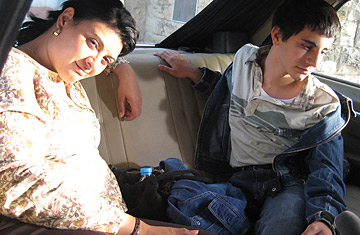
A scene from Amreeka
Muna Farah (Nisreen Faour), the Palestian single mother who moves with her son from the West Bank to Illinois in the new film Amreeka, is painfully unprepared for the world outside the West Bank. When the customs agent at Chicago airport immigration asks for her occupation, she answers "Yes" with great enthusiasm, referring to the political state she's lived in. She's the sort of person who, if confronted with the anti-immigrant sentiment "Why don't you just go home?" would naively attempt to give an earnest answer, explaining about the limited educational opportunities for her smart teenage boy Fadi (Melkar Muallem) in West Bank, or how long her commute to and from Bethlehem became after Israel stepped up construction of the Israeli West Bank barrier. Or maybe she'd elaborate on what it felt like every time she bumped into the far prettier and thinner woman her ex-husband left her for. If she were your mother, you'd be dead of embarrassment. But she's also very brave, so it's hard not to be won over by her.
Amreeka (Arabic for "America"), written and directed by Cherien Dabis, is as good-hearted as Muna, although thankfully not so naive. Dabis, who worked for several seasons on The L Word, is the first member of her Palestinian/Jordanian family to be born in the United States, and she focuses the story on a better-than-average immigrant experience. Muna arrives with a Green Card, one she applied for years ago and never expected to get. She can work legally, but to her great shame no one will hire her but the local White Castle franchise. There's no sex slavery to escape from or mercenary coyotes chasing her; it's just that her situation comes with a base level of resentment, humiliation, discomfort and homesickness. The movie is most effective when it is illustrating the pain of not feeling comfortable anywhere, of knowing that no matter how bad your new home is, it's worse back in your old home.
Muna and Fadi's transition to life in America is made easier in a practical sense by having family to move in with. Her sister Raghda (Hiam Abbass, who starred in The Visitor and makes wrinkles look elegant) is married to a doctor, Nabeel Halaby (Yussef Abu Warda), and one of their three daughters vacates a bedroom for them. The house is big, the neighborhood good and Fadi enrolls in the nearby public school. The other students are awful to him, but at least he has his hip, rebellious cousin Salma (Alia Shawkat, Maeby from Arrested Development) to hang out with.
But to be an outsider in any home is fraught, and life in the Halaby household mirrors their larger American experience. Technically, they've been welcomed, but Muna overhears Nabeel and Raghda murmuring about money woes and extra mouths to feed; he's been losing patients because he's an Arab (although not a Muslim, which is an assumption that gets made about all of them repeatedly) and they are two months behind on the mortgage. Moreover, even though the Halabys have been in America for nearly two decades, they still are subject to threatening anonymous letters. Facing their own trouble, they have low expectations of Muna's potential to survive. And that's without even knowing the half of Muna's innocent mistakes, starting with the fact that she packed all the money she had in the world into tins that were toted off at Customs because they were thought to be full of food.
Dealing in cash only is a classic trap for immigrants — when it's gone, it's really gone — but Dabis stretches her credibility here. Having worked in a bank in the West Bank for 10 years, Muna would surely have planned ahead, if only where the transfer of money is concerned. Dabis also introduces a romantic interest (Joseph Ziegler) for her whose presence feels a little too convenient. It's nice to think of Muna having a fairy-tale ending, but after witnessing her struggle with the White Castle fry-o-lator and get sucked into the trap of selling weight loss supplements — a loose story thread that never gets cleaned up — we're more disposed to thinking there are still hard times ahead. But these are relatively small missteps in a tender portrayal of struggle — a struggle that will be recognizable to many residents of America, citizens and otherwise.
